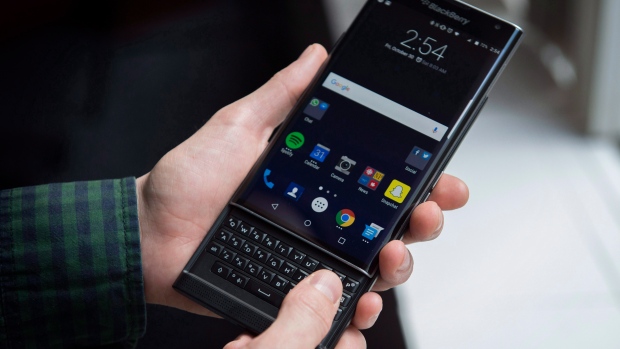Jun 23, 2016
BlackBerry CEO committed to hardware business, despite lacklustre Priv sales
, The Canadian Press

WATERLOO, Ont. -- BlackBerry CEO John Chen refuses to give up on the company's hardware business despite lacklustre sales of its first Android-powered phone, the Priv.
The Canadian smartphone maker (BB.TO) reported a US$670 million net loss in the first quarter of its 2017 financial year, but said its recovery plan for the year remains on track.
Chen, who has stated the company's No. 1 goal is to make its smartphone device business profitable this fiscal year, said he expects the company's new mobility solutions segment to break even or record a slight profit during the third quarter, which ends Nov. 30, 2016.
The mobility solutions business will focus on boosting device sales by targeting new distribution channels and starting up a mobility software licensing service, Chen said Thursday.
"I really, really believe that we could make money out of it... out of our device business," he said during a conference call with analysts Thursday morning.
During BlackBerry's first quarter -- the second full quarter to include Priv sales -- the smartphone segment generated US$152 million of revenue and had a US$21-million operating loss.
The company sold roughly 500,000 devices at an average price of US$290 each, he said, which is about 100,000 smartphones fewer than the previous quarter and about 200,000 fewer than two quarters earlier. BlackBerry previously said the company needs to sell about three million phones at an average of US$300 each to break even.
Chen said the Priv has proved unaffordable to most, except for top-level executives.
The company plans to release two mid-range, Android-powered phones before its current fiscal year ends Feb. 28, 2017, he said. More information on these devices is expected next month.
BlackBerry will also start to license some of its device software to help drive growth and profitability in the company's mobile services business segment, he said.
Chen previously indicated the company will stop making smartphones if the device business remains unprofitable. While he doesn't believe this will be a necessary step, he said the software licensing plan could help make that transition smoother if the time comes.
BlackBerry, which started reporting revenue by three main segments this quarter, showed operating profits in its other two businesses: US$37 million from software and services, and US$78 million from service access fees.
The company said it plans to grow revenue by 30 per cent in software and services, as well as report an adjusted loss of about 15 cents per share -- compared to analyst estimates of a 33-cent loss -- this fiscal year.
This quarter, BlackBerry's loss amounted to US$1.28 per share and included a US$501-million writedown of the smartphone company's assets and US$23 million in restructuring charges, among other things.
Excluding writedowns, restructuring and certain other items, BlackBerry came close to breaking even with an adjusted loss of US$1 million -- which was better than analyst estimates.
But revenue was below analyst estimates at US$400 million under generally accepted accounting principles, or US$424 million with certain adjustments.






